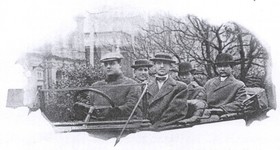 Sun Yat-sen (right) in an early 20th century Buick. (Photo: GM)
Sun Yat-sen (right) in an early 20th century Buick. (Photo: GM) What will this mean for the classic car market in general? There's currently a discussion thread on such prospects at LinkedIn. Some believe it will cause a spike in interest and prices for Ferraris, Maseratis and other older exotic cars. We take a different view. We think it will drive prices higher for good old American Buicks.
Here's why: As General Motors notes in its China Overview, "The Buick brand has a long and distinguished history in China that dates to the early days of General Motors itself. In the first part of the 20th century, Buick was a car of choice for the country's influential citizens." Among Buick aficionados were Dr. Sun Yat-sen, China's first provisional president; Zhou Enlai, China's Communist premier; and Pu Yi, China's last emperor. "According to statistics from the Shanghai government," says GM, "in 1930, one out of every six cars on the city's roads was a Buick."
While Buick has had to resurrect its name here in the U.S., no such reputation-building was necessary in China. When the General began regular production at its Shanghai GM joint venture in 1999, it says, "Buick was the chosen brand -- largely because of its legacy in China as a prestigious automobile." Today, the brand regularly sets sales records in that country.
So mark our words that we will see vintage Buick prices rise and exports to China become commonplace once the ban is lifted. To learn more about Buick in China, visit GM's media site on the brand.

 RSS Feed
RSS Feed
